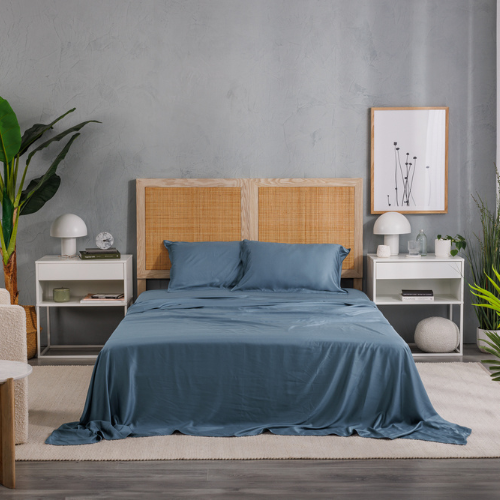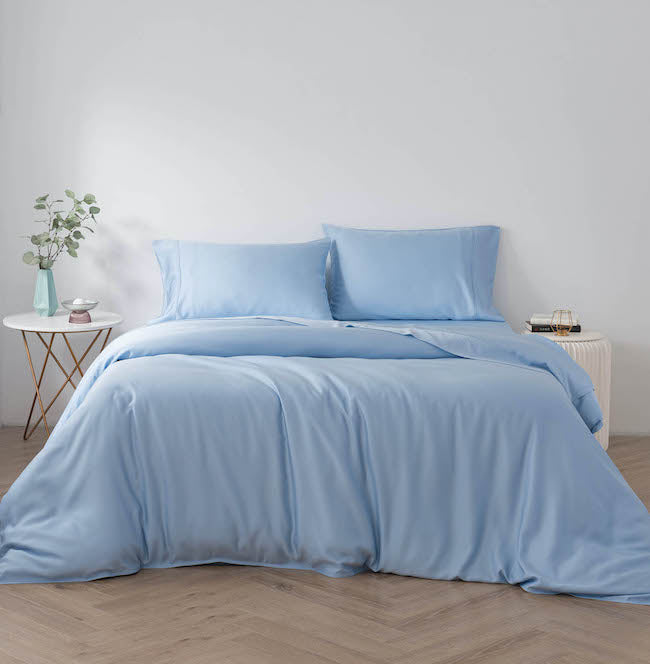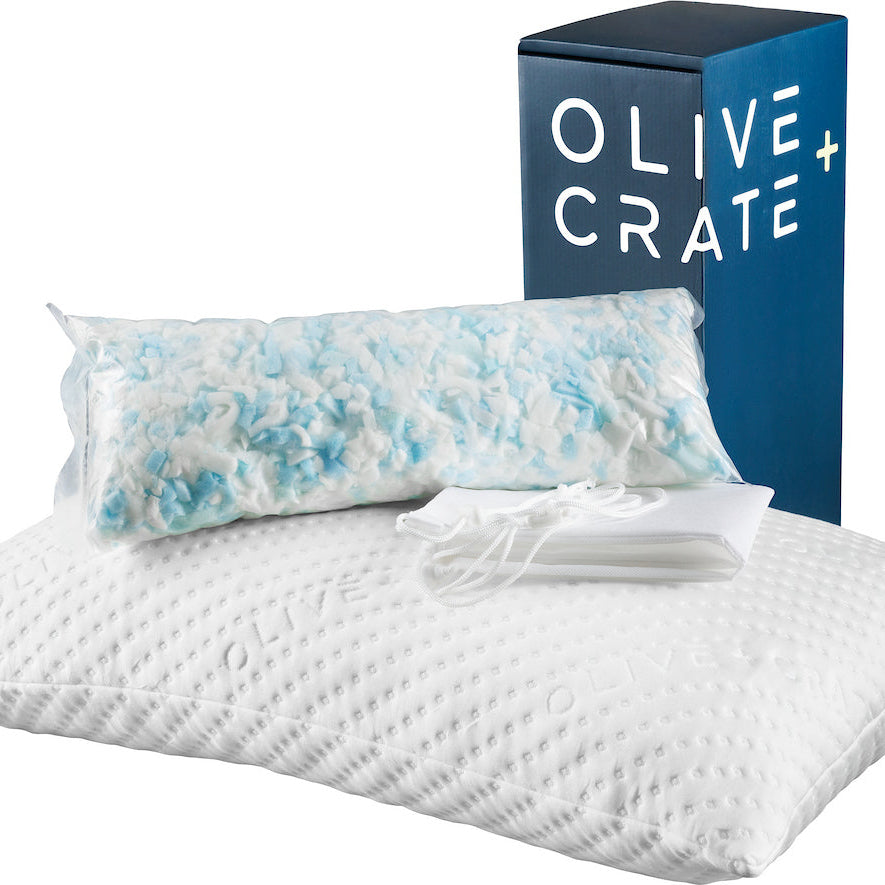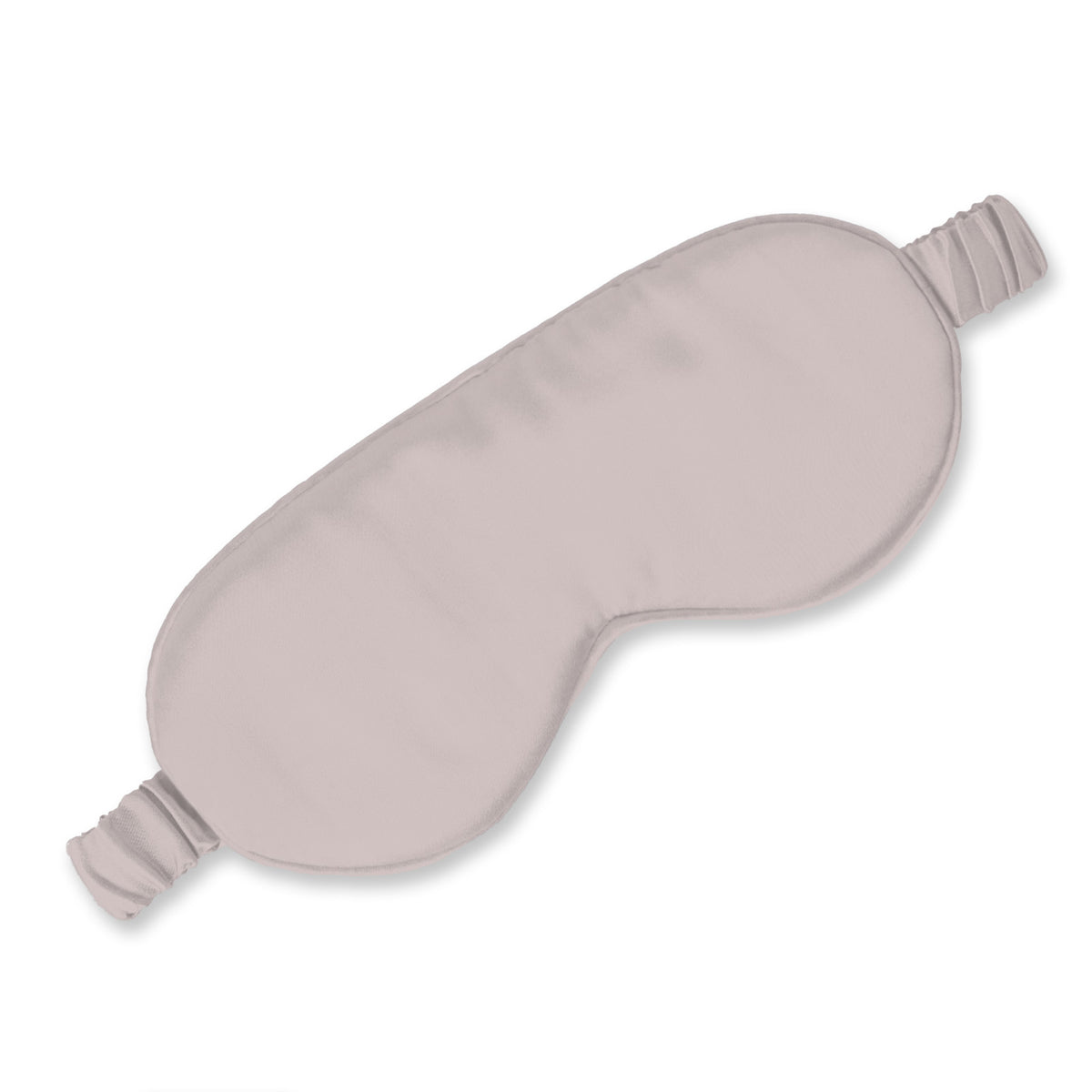TENCEL sheets are low-maintenance by nature, but they do respond to how they’re treated.
The difference between sheets that feel soft and fluid for years and sheets that feel stiff or tired often comes down to a few small habits in washing, drying, and storage.
This guide walks through those habits clearly and practically, so you know exactly how to care for your eucalyptus fiber bedding without overthinking it.
What Is TENCEL?
TENCEL is a branded form of lyocell made from sustainably sourced eucalyptus wood pulp. It’s known for its smooth feel, breathability, and durability, all of which influence how the fabric should be cared for.
From a care perspective, TENCEL fibers are:
-
Smooth rather than coarse
-
Naturally breathable and moisture-aware
-
Strong when dry, more delicate when wet
This combination is why gentle washing, cold water, and low heat matter.
If you’re curious about the fiber beyond bedding, we’ve explored what TENCEL is and how eucalyptus fabric is used across fashion and home.
Why TENCEL Sheets Require Different Care
Understanding the benefits helps explain the care approach.
Naturally smooth fibers
TENCEL does not rely on chemical softeners. Its smooth surface creates a soft feel on its own, but that surface can be worn down by excess heat or friction.
Breathable and moisture-aware
The fibers absorb moisture and release it efficiently, helping sheets feel dry and comfortable. This also means they respond best to low heat during washing and drying.
Strong, but sensitive to friction
Lyocell is durable, yet repeated rubbing and high agitation can weaken the fiber surface over time. Gentle cycles help preserve the weave.
Responsibly produced
TENCEL uses fewer resources than many traditional fabrics. This is further explored in our guide on why TENCEL is better for the environment than cotton and linen.
Preparing Your TENCEL Sheets for Washing
TENCEL sheets don’t need to be washed before first use.
Leaving them unwashed helps preserve their original drape and smooth finish.
Unlike conventional cotton, the fabric is naturally clean and smooth, which is why it often feels cool straight out of the package.
That said, some people prefer a first wash to soften the hand feel slightly or remove packaging creases.
If you choose to pre-wash:
-
Use cold water only
-
Skip detergent or use a half dose of mild liquid detergent
-
Avoid any additives, even on the first wash
Hot water or heavy detergent at this stage can set in stiffness early, which is harder to reverse later.
Washing Your TENCEL Sheets
How Often to Wash
TENCEL sheets do not benefit from frequent washing in the way cotton sometimes does.
For most households:
-
Every 10 to 14 days is sufficient
-
Weekly washing is appropriate only if you perspire heavily or sleep in very warm conditions
Because lyocell fibers release moisture efficiently, sheets tend to stay fresher longer.
Over washing introduces unnecessary friction, which is one of the primary causes of surface wear and pilling.
Rotating between two or more sheet sets gives the fibers time to fully relax between uses and significantly extends lifespan.
For more guidance on building a realistic wash routine, here’s a thoughtful insight on how often you should wash your sheets.
Sort and Pre-Treat Before You Wash
This step has more impact than detergent choice.
Before washing:
-
Wash sheets only with other bedding or similarly soft items
-
Keep them away from towels, denim, hoodies, or anything textured
-
Close all pillowcases to prevent edge abrasion
-
Turn pillowcases inside out to reduce friction on the outer surface
For stains:
-
Always treat before washing
-
Use cold water and blot gently
-
Apply a small amount of mild detergent and let it sit for 10–15 minutes
Avoid scrubbing. Scrubbing disrupts the smooth lyocell surface and can leave a visible dull patch even after the stain is gone.
How to Wash TENCEL Sheets in a Washing Machine
This is where most care mistakes happen, not because of neglect, but because of habit.
Water temperature
-
Cold water only
-
Warm or hot water causes lyocell fibers to swell, which increases shrinkage and weakens the weave
Washing machine setting
-
Gentle or delicate cycle
-
Shorter cycles are better than long, soaking washes
Spin speed
-
Low to medium spin
-
High spin compresses wet fibers, leading to deep creases and surface stress
This applies whether you’re using a top loader, front loader, or washing TENCEL sheets in a washer and dryer set.
Detergents and Additives That Work Best
Detergent residue is a common cause of stiffness and lingering odor in TENCEL sheets.
What works best
-
Mild liquid detergent
-
Low-sudsing formulas
-
Half the amount you’d use for cotton
What to avoid
-
Powder detergents (they don’t rinse cleanly from smooth fibers)
-
Bleach or whitening agents
-
Fabric softener
-
Enzyme-heavy detergents
A common question is whether OxiClean can be used on TENCEL. It’s best avoided.
Oxygen-based cleaners can weaken lyocell fibers over time and cause thinning, especially in areas of repeated friction.
Fabric softener is unnecessary. It coats the fibers, reducing breathability and making sheets feel heavy rather than soft.
Drying TENCEL Sheets Without Damage
Drying is where long-term texture changes usually occur.
Air drying
-
Ideal whenever possible
-
Helps preserve the fiber’s natural fluidity
Using a dryer
-
Low heat only
-
Low tumble setting
-
Remove sheets while still slightly damp
TENCEL dries faster than cotton. Extended dryer time adds heat without benefit.
If you’re wondering whether you can put TENCEL sheets in the dryer or tumble dry them, the answer is yes, but only with restraint.
What Happens to TENCEL in the Dryer
High heat can:
-
Lock moisture unevenly into the fibers
-
Create stiffness that feels “papery”
-
Increase shrinkage and pronounced wrinkling
Most stiffness blamed on washing actually comes from over drying.
Wrinkles, Ironing, and Everyday Finishing
Does TENCEL Wrinkle?
Yes, but differently than cotton.
TENCEL wrinkles tend to be soft and fluid rather than sharp. They often relax once the fabric is under light tension, such as when fitted onto the mattress.
To minimize wrinkles:
-
Remove sheets promptly from the dryer
-
Smooth them over the bed while slightly damp
-
Let them finish drying in place
Can You Iron TENCEL Sheets?
You can, but ironing should be minimal and intentional.
If ironing:
-
Use the lowest lyocell or silk setting
-
Iron while the fabric is still slightly damp
-
Avoid steam bursts and pressure
High heat can flatten the fiber surface, reducing softness rather than improving appearance.
Shrinkage, Stiffness, and Texture Changes
Does TENCEL Shrink More Than Cotton?
No. When cared for correctly, shrinkage is minimal.
Shrinkage occurs primarily when:
-
Washed in warm or hot water
-
Dried on medium to high heat
Cold washing and low heat drying prevent most size changes.
Why Lyocell Feels Stiff After Washing
Stiffness is usually temporary and correctable.
Common causes:
-
Over drying
-
Detergent buildup
-
Insufficient rinsing
To restore softness:
-
Reduce dryer time
-
Add an extra rinse cycle
-
Allow sheets to relax through use
The fibers often loosen naturally after one or two nights on the bed.
Stains, Odors, and Pilling
Does Lyocell Stain Easily?
Lyocell does not stain more easily than cotton, but its smooth surface shows residue if stains are treated aggressively.
Best approach:
-
Blot with cold water
-
Apply mild detergent sparingly
-
Rinse thoroughly
Avoid stain sticks or abrasive treatments.
Lingering Odors After Washing
If sheets retain body or chemical odor:
-
Reduce detergent quantity
-
Ensure full rinsing
-
Avoid fabric softener
-
Dry completely before storage
Odors are usually caused by residue, not bacteria.
Why TENCEL Sheets Pill
Pilling comes from friction, not poor quality.
Common causes:
-
Washing with rough fabrics
-
High agitation cycles
-
Repeated rubbing in the same areas
Washing sheets separately and using gentle cycles prevents most pilling.
Storing Your TENCEL Sheets
Storage affects longevity more than most people realize.
Best practices:
-
Store in a cool, dry space
-
Keep out of direct sunlight
-
Use breathable cotton storage bags
Avoid plastic bins or vacuum storage, which trap moisture and can dull the fabric over time.
What Wears Down TENCEL Sheets Over Time
The biggest contributors are:
-
Excess heat
-
Harsh detergents
-
Repeated friction
-
UV exposure
Rotating sheet sets and following gentle care habits significantly extends lifespan.
For a detailed perspective on when it’s time to refresh your TENCEL bedding, explore our guide on how often you should buy new sheets.
Additional Frequently Asked Questions
Is TENCEL dry clean only?
No. TENCEL is designed for machine washing.
What is the disadvantage of TENCEL fabric?
It is sensitive to high heat and benefits from gentle care.
How to make lyocell soft again?
Reduce heat exposure, rinse thoroughly, and allow the fabric to relax through use.
Conclusion
TENCEL sheets do not require complicated care, but they do respond to attention. Cold water, mild detergent, low heat, and thoughtful handling preserve their softness and breathability.
When cared for well, eucalyptus fiber bedding becomes more comfortable with time, settling into a texture that feels familiar and refined.













